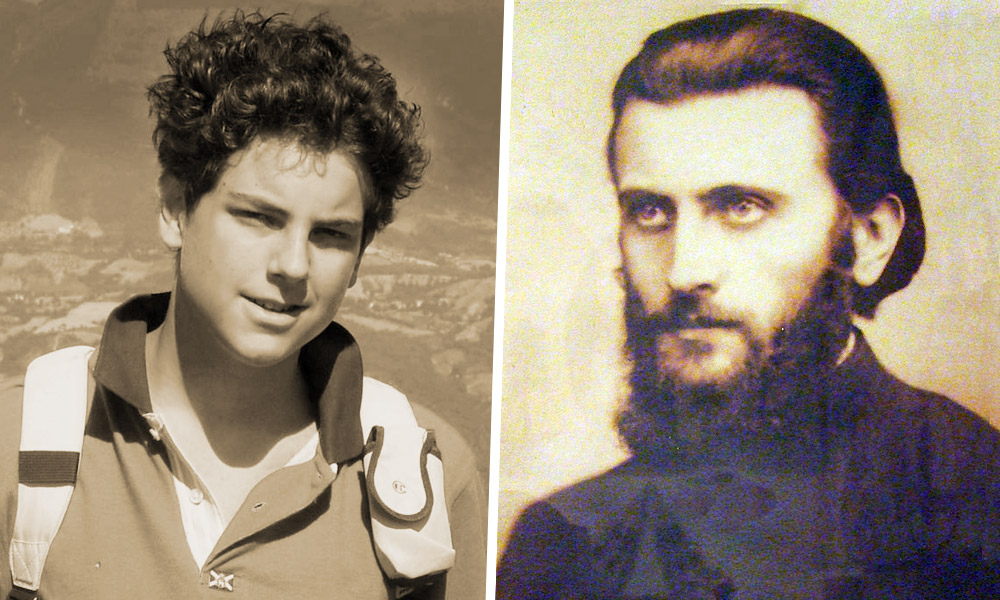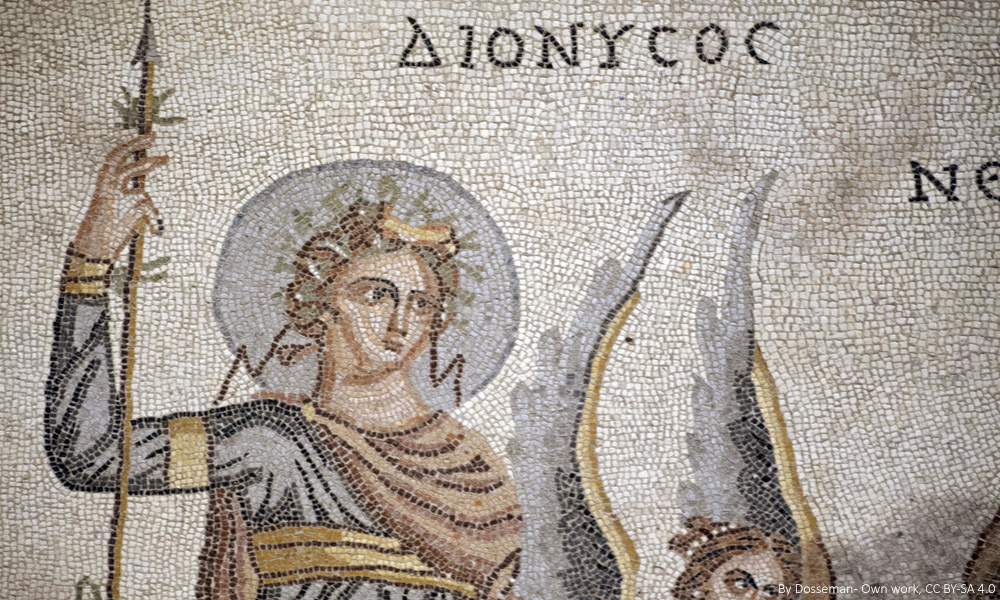
This article chronicles my involvement with, and approach to, Christianity from my early childhood years up until the present. It also presents both my criticisms of the Christian religion as well as my defenses of it.
My Early Years – The Core of My Approach
As I said in my spiritual biography, I was not raised in an overtly religious household. Of my two parents, the more religious one in a conventional sense was my mother, who came from a Polish Catholic background, so most of my early exposure to Christianity came from my mother. And since young children have not yet developed the abstract thinking capability to get much into matters of theology and doctrine, my approach to Christianity centered around my perception of, and relation to, Jesus. As a child, my ability to sense and perceive spiritual energy was quite acute and intense; therefore, my perception of Jesus was that he was someone who was very holy, in whom spiritual energy abounded – “full of grace and truth”, in the words of the Prologue to John’s gospel. Beyond that, my basic orientation towards Jesus was as a spiritual hero and role model, as someone who I would strive to emulate and even identify with. And even beyond that, Jesus was a spiritual friend, as well as a friend of the downtrodden and a tireless advocate for spiritual justice. In other words, Jesus was the good guy of good guys.
It wasn’t until I started to get older that I gradually became aware that not everyone who proclaimed themselves to be Christian had the same approach to Jesus as I did. All the crushing indoctrination in sin and guilt, and all the authoritarianism that revolved around the conventional Christian conception of God seemed to me to be a bit too heavy handed and excessive. And in marked contrast to my own innate tendency to consider Jesus to be a spiritual hero to emulate and identify with, it gradually dawned on me that there was a lot of pretense and posturing regarding Jesus on the part of conventional Christians that I didn’t like; they definitely weren’t trying to emulate or identify with Jesus. It was only later that I realized that all of this stuff I didn’t like was part of a grand theological edifice that surrounded Jesus as the Son of God, which formed the foundation of Christian doctrine. And as these realities of relating to the larger community of those who called themselves Christians gradually dawned on me, I became acutely aware of the essential differences between my approach and theirs.
Nevertheless, I did not dismiss Christianity, and religion in the broader sense, out of hand and become an agnostic like my father, or an atheist. The early childhood spiritual experiences that I had would not let me do that, and convinced me that God and Spirit were not simply metaphors or abstractions; they were real. And so, when my father, in his more agnostic moments, said that religion was basically an emotional crutch to help people who didn’t have the requisite inner strength get through hard times, I didn’t really buy that. Could the whole living reality of religion and spirituality be reduced to the status of an inanimate object, or a mere compensator for weakness? In his more cynical agnostic moments, dad was fond of saying things like, “If you’re going to go off the deep end with religion, at least it’s good to do so with a good piece of literature (the Bible) to read.” At least he had learned the literary value of the Bible from his preacher father, even if he had rebelled against his heavy handed religion. In my more cynical moments, I tended to refer to my father’s agnosticism as “atheism lite”.
A therapist I saw in the months following my father’s passing really emphasized to me the importance of legacies, which can even transcend the power of the rational mind in their enduring influence. For example, my father and all his siblings had rebelled against the heavy handed religious upbringing that their father, a Presbyterian minister, had subjected them to. But had they totally shaken off and liberated themselves from its influence – or did it still have a hold on them on a subliminal, subconscious level? And beyond matters of religious affiliation, other aspects of one’s early family situation, such as personal defects and dark secrets of one or more of the parents can also have a profound effect as well. Anyway, the college I went to was a Presbyterian one, and while I was going there, I didn’t really think that much about what Presbyterianism was – I didn’t much care. But later on, as I began to research Christian sects and denominations, I discovered that the Presbyterian Church is one of the Calvinist sects, with Calvinism being the most heavy handed Christian persuasion regarding sin and damnation. Yuk!
Too many people are too casual and superficial in their approach to choosing a church or denomination of Christianity, or of any other religion for that matter; too many are also in a certain church just because of family ties. For example, when I was a boy in Japan, we had a certain servant who was a member of Soka Gakkai, one of Japan’s modern Buddhist sects, just because they had great parties and picnics. Even though you may not personally believe in everything that your church and its denomination teaches, I believe that, in a subliminal or subconscious way, you may still be influenced by it. So – choose your church well. To conclude the story of my early attitudes towards Christianity, I would like to say that a very large part of the karma one has in life is sorting out the differences between your own innate self and its nature versus the early family environment you grew up in. And there are basically three ways this can play out: either it’s a perfect fit, or at least a very good one; or there are significant differences to work out; or it’s a total misfit – a crazy making madhouse of incongruities.
Christianity in My High School Days
I went to an international school in my high school days; my high school alma mater was ASIJ, or the American School in Japan. English was the language of instruction, but students of all nationalities attended my high school. Although my high school was secular in its orientation and did not have any religious backing or affiliation, there was still a large contingent of missionary kids who went to ASIJ; besides the missionary kids, other students either came from families with a business background or kids like me, who came from a government and diplomatic background. And even the missionary kids were not immune from having to go through their own internal struggles with their religious upbringing – those struggles were, in many cases, more acute and severe. I remember one friend of mine who was super serious about his religion when I first met him, and then came back a total rebel, really into gothic and heavy metal, after spending a year in the States. The process could work the other way, too – missionary kids who had been wild and rebellious, but then decided to get more serious about their religion . Other missionary kids managed to hold up and be perfect paragons of virtue; I remember one of them, who was the pianist for our high school choir, who was an informal spiritual counselor and sister confessor to many of us students at ASIJ. She was wise way beyond her years, and seemed to have no problems at all.
I graduated from high school in 1970, and yes – the summer before I graduated, some students from my high school made it half way around the world to attend Woodstock. It was the late sixties, the Vietnam War was raging, and there were all kinds of protests going on, both in Japan as well as around the world. Many students at my high school, both missionary kids and otherwise, took part in these protests, but as for me personally, being an American diplomat’s son, I had to toe the line and refrain from participating. But inwardly, I was a hippie through and through; who was Jesus if not the ultimate spiritual revolutionary and peace and love hippie? I admired, and even envied, the missionary kids, who were much freer to follow their conscience and get involved in the protests. With a lot of these missionary kids, the social gospel was very important, and what was happening in Vietnam was a total travesty of spiritual justice; again, I empathized with them wholeheartedly. Also big in those days was the Esalen Institute, and the sensitivity training and therapy groups that went on there; we formed a little club in our high school to do sensitivity training exercises like face feeling and stuff like that.
I had one lady friend, a fellow student in my high school, who wasn’t from a missionary family, who nevertheless was strongly devoted to Jesus; I really had the hots for her, but the feeling was not mutual. Also part of the whole sixties scene were the Jesus Freaks, or hippies who had found Jesus. Beyond today’s evangelical Christians, who are always out proselytizing and trying to win souls for Christ, I sensed that her Christian spirituality went deeper than that. For one thing, she was not really into trying to push her religion on anyone, even though she was quite enthusiastic and outspoken about it. Another interesting thing is that she told me that she believed in reincarnation. Another friend of mine told me that, if she believed in reincarnation, she could very well have been one of Jesus’ original followers, reincarnated. Although she often professed spiritual humility, saying that she was nothing but a slave of Christ, the reality was that she still had a pretty strong ego, as being the perfect Christian high school student. Nevertheless, her faith did impress me.
My Main Objections to Christianity in a Nutshell
Being born and raised a diplomat’s son, and growing up mainly in the Far East, I was exposed, from a very young age, to religions, philosophies and world views that were quite different from my own. And my diplomat father was all for building bridges of understanding, not walls of fear and ignorance. Given this international and cosmopolitan upbringing, it was virtually impossible for me to believe that one religion alone was the exclusive path to heaven and salvation. Sure, the Christian religious tradition had its Bible, but other religions, which had grown and evolved in other parts of the world, also had their sacred texts as well, and to me it seemed to be very insular and ethnocentric, or religio-centric, to believe that one religion could claim a monopoly on truth and salvation. Yet, that is exactly what many, if not most Christians believe. But does Christianity have any solid basis for making such claims? In the pages of this website, I will be tackling this central question from a wide variety of angles and perspectives.
There are various reasons why Christians hold this belief that their religion offers the one and only path to truth and salvation, and I call this whole complex of religious attitudes Christian exceptionalism. Because Christians believe that the founder of their religion, Jesus Christ, alone was the incarnation of God on earth, this puts their religion in the unique category of being “of God”, in direct contrast to all other world religions, which are merely “of man”. But here again, how true are these claims, and do Christians have any solid basis for making them? What are the actual historical facts, and do they support such claims? Is there any solid basis that supports all this Christian chauvinism and hubris, or is this mere presumption on the part of Christianity?
Perhaps the thing that I hate the most about Christianity, at least as it exists in the hearts and minds of too many Christians, is what I call the belief in a Gangster God. Let me explain. Many, if not most, Christians believe that God is offering man an either / or binary choice: Either accept His Son as your personal lord and savior, or fry in hell for all eternity. In other words, God, like Al Capone, is making you an offer you can’t refuse. Now really – is God really that petty, dictatorial and thin-skinned that He would do something like that? Here again, does Christianity have any solid basis for making such claims, or is this just sheer presumption? My uncle Ralph, my father’s brother and an avowed atheist, told me that when a Christian comes to you trying to get you to join their religion, just as important as the positive reasons they give you for joining the Christian religion are the negative threats regarding what will happen to you if you don’t. It is precisely here that the light of Christianity casts the biggest shadow.
Another aspect of Christian exceptionalism that I also take issue with is that, all too often, being Christian becomes nothing more than membership in an exclusive club or clique of the saved. This attitude can be summed up best in a Christian bumper sticker that I saw once; it said, “Christians aren’t perfect – just FORGIVEN” – with the word “forgiven” written in stark, large letters. Implicit in this bumper sticker is the idea that Christians have somehow cornered the market on forgiveness, or that Jesus has given them a “get out of hell free” card in some cosmic monopoly game – and all they had to do to obtain this privileged status was to profess their faith in Jesus. This cheapens the whole notion of forgiveness and redemption and reduces it to the status of a banal transaction. Religion is supposed to provide a path for self improvement and becoming a better person, but the way too many Christians behave, they act like they can do whatever they want, just as long as they proclaim their faith in Jesus.
This leads me to two of my favorite quotes from Gandhi on Christianity and Christians. In one of them, Gandhi remarks on how much he loves the Christian Christ, and how unlike Christ is to the vast majority of Christians. And in the other quote, an English gentleman asks Gandhi what is his opinion of Western civilization, to which Gandhi responds with the following comeback: “I think it would be a very good idea.” There is a very strong case to be made that a civilization is the natural consequence or outgrowth of its dominant religion, and for Western civilization, that would definitely be Christianity. “By their fruits shall ye know them,” said Jesus when speaking of false teachers – and the fruits of Western Christian civilization leave a lot to be desired.
These objections or critiques of mine regarding Christianity do not mean that I consider all of Christianity to be totally flawed and worthless. The Christian spiritual tradition has still managed to produce many saintly individuals, but even here, one must sift through many whom the church has canonized as saints to find the true spiritual giants and geniuses. Even today, there are still Christians who manage to maintain a high level of spiritual sincerity in their faith. One must diligently dig down below the evangelical / fundamentalist sideshow that goes on at Christianity’s surface to find individuals, and individual strands within the greater Christian tapestry, that have exhibited true and sincere spirituality, and a genuine desire to apply the teachings of Jesus, Paul and the other founding fathers of the Christian religion. In my opinion, from the research I have done, the real treasures of Christianity lie not in the newer Protestant and Evangelical sects, but rather in the older denominations like Roman Catholicism and Eastern Orthodoxy. With more history behind them, they have naturally had more time to develop and perfect sound spiritual technologies to aid in the aspirant’s quest for God and Christ. I’m not saying that these older denominations are totally spotless or blameless; it’s just that I feel like they have more of genuine worth to aid the spiritual seeker if one is spiritually discerning.
Too much of Christianity is based merely on blind faith and belief; in no other world religion that I know of is the salvations of one’s very soul as dependent on correctness of belief as it is in Christianity. The average Christian is thoroughly indoctrinated from a very early age, and to those who are skeptics regarding Christianity, the term “indoctrinated” may just be a polite euphemism for “brainwashed”. Their minds are filled with a lot of doctrines, dogma and Bible verses on what they gotta believe from their church pastors, leaving little room for anything else. Few indeed are those Christians who really take the time and effort to independently study the Scriptures and the Christian spiritual tradition, who afford themselves the spiritual freedom and independence to conduct their own investigations, and to come to their own conclusions. To tell you the truth, I feel that most atheists and agnostics know more about the history, origins and traditions of Christianity than believing Christians.
The Purpose of This Website
This website is designed primarily with the intention of remedying Christian ignorance and narrow mindedness about their own religion. It will use the tools of history, research and textual criticism of the Bible as well as extra-canonical scriptures, as well as reason, logic and philosophy to weigh and evaluate the validity of Christian claims and doctrines. Historically speaking, we will sift through the evidence and arguments for certain positions, and the relative probability of each, recognizing that, after so many years, the case has often grown very cold, and the evidence has often been spun or covered up by the shifting sands of time. By weighing the relative strength of the various arguments advanced, both by Christianity’s advocates and proponents, as well as its critics and detractors, I intend to establish the fact that the evidence is not always clear cut in favor of the Christian position, but may often lean against it. Regarding the disciplines of analysis and criticism of Scripture, both within the Christian Bible as well as outside it, with the strongest and most basic evidence coming from within the Christian Bible, my goal is to get my readers to take a fresh look at Scripture that moves beyond a simple blind faith in it, and to realize that the authors of the various books of Scripture had very human motives as well. And finally, the tools of logic, reason and philosophy can be very useful in elucidating how you yourself feel about traditional Christian doctrine, and how it sits with you.
A lot of you may be thinking, “Then what will be left to believe in?” after I finish my analysis of Christianity, which many will feel to be a merciless deconstruction of it. Indeed, if your adherence to Christianity has been based more on doctrine and dogma, and on what you view as correctness of belief, you may wonder what there is left to believe in. But from my perspective, matters of doctrine and dogma occupy a more superficial place in the overall scheme of things in Christianity, whereas faith is something that transcends doctrine and dogma, existing on a deeper spiritual level than the latter. For example, a search for the historical Jesus may yield all kinds of evidence, both for and against the historicity of Jesus of Nazareth; the inner Jesus of faith is something that lives in your heart and soul, that does not depend on outer evidence, be it pro or con. It is my sincere hope that any narrow doctrine or dogma that I may deconstruct will be replaced with an article of faith that is broader, truer and more inclusive. Questioning leads to spiritual growth, evolution and self-discovery.




